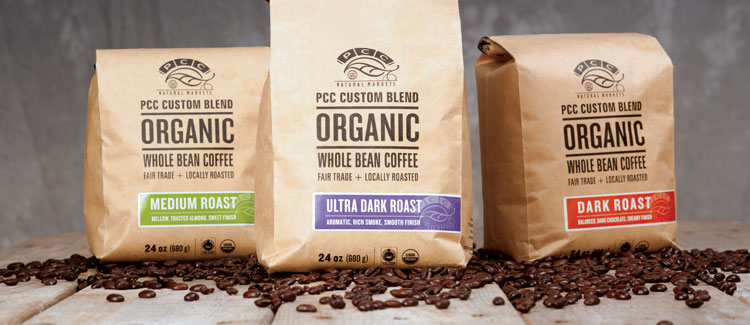Locally roasted exclusively for PCC
This article was originally published in October 2016

After a year of tastings and tweaks to get the roasts just right, we’re excited to offer three delicious and distinct brews that pack plenty of zip. All three PCC roasts are made from certified organic beans that also are shade-grown and fairly traded. You’ll find them in 24-ounce packages.
Medium Roast
This roast is mellow, with notes of toasted almond and a sweet finish. It offers the most complex flavor profile of the three roasts and is the best option for those who want to really taste the spectrum of flavors found in the bean.
Dark Roast
A great all-purpose roast, this coffee is the best for general drinking. Similar to French Roast, it retains some of the complexity of the beans while delivering a full-flavor hit. It’s balanced, with notes of dark chocolate and a creamy finish. Well suited for espresso as well as drip, our Dark Roast will stand up to creamers without losing its character.
Ultra Dark Roast
You asked for it and here it is — an aromatic, extra-dark coffee with notes of rich smoke and a smooth finish. It will stand up to anything you put in it, from milks to syrups. You’ll also find us serving it up in our espresso bars.
What’s the best way to brew?

Brew methods that employ a paper filter help bring out the complexity in a coffee, which makes them great for light-roasted and single-origin coffees. If you’re brewing a medium- or dark-roasted coffee, a method that uses a metal filter will accentuate the heavier body and deeper flavor notes these roasts are known for.

Using the proper grind is essential for brewing a great cup of coffee. You want to use a larger grind size for methods that call for a longer brew time (French Press), and a finer grind for methods that call for a shorter brew time (AeroPress or espresso). A burr grinder is a great investment, as it will produce more uniform grind size.

The coffee experts at Tony’s have made short video guides for seven of their favorite brewing methods — AeroPress, Chemex, Auto Drip, Dripper Cone, Cold Brew, French Press and Stovetop. View them at tonyscoffee.com/education. They’ll help you make a perfect cup every time!

FRESHNESS
Use coffee within two weeks of opening the bag. Store in an airtight container, away from direct light.

WATER
Use water that is roughly 200° F, or 30 seconds off boil.

RATIO
A good ratio to remember is two tablespoons of coffee for every 6 ounces of water. Adjust based on the coffee, and your taste.
All coffee at PCC — not just Tony’s — is organic, fairly traded, shade-grown, and Northwest-roasted. Shade-grown means it’s grown under a canopy of diverse shade trees, often on small farms using traditional techniques. Shade-grown coffee fields provide food and shelter for songbirds, as well as habitat for other animals and plants.
